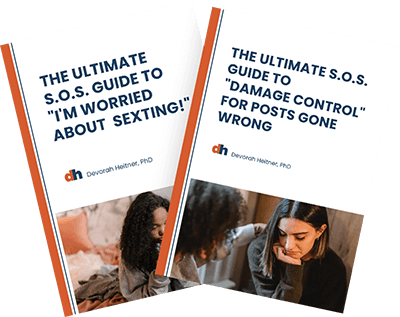Are you stressing about teens and social media? As we raise kids with social media, figuring out what to share and what to keep private is a nuanced task. When I was a teenager, the taboos against talking about getting mental health support like therapy were overwhelming. I saw a therapist, and no one ever told me: don’t share that…I just got the memo.
When I was interviewing teens for Growing Up in Public, I learned that some of them are sharing about things we used to be very quiet about. Sexual Orientation. Neurodiversity. Mental Health. It makes some parents very nervous! These are tough issues to talk about face-to-face, and the social norms at most middle and high schools can discourage openness and vulnerability. Plus parents grew up with stigma, and we worry about our kids’ safety.
Instead, the culture at many high schools celebrates being cool, collected, and “chill”—not being so emotional or caring so much about things. For vulnerable kids, the upsides of sharing their identities and experiences in an online affinity space may outweigh the risks of disclosing sensitive personal information. While I also want all kids to have access to in-person support, including therapy, if needed, I also want parents and educators to understand the ways kids are changing the world for the better by sharing so openly!
Why do kids share so much about themselves?
- They want to find “their people” – and being open/honest about themselves makes that easier. Many young people (and many adults) appreciate the sense of community and group support that can come from joining online affinity spaces, like a Discord server for fans of a specific literary genre, or a server for people with a specific diagnosis like dyslexia. Finding a group of people with a shared identity is very supportive–especially for kids who feel marginalized or vulnerable.
- They want to explore sexuality and gender issues. Young people who come out as LGBTQ+ online are coming into the community as much as they are coming out to the world. Kids who find an accepting, embracing community, on- and offline, are likely to be safer, even though being out still exposes young people and adults to homophobia and transphobia.
- They want to talk about their neurodiversity or mental health status. Again, as much as we, in older generations, were taught to keep quiet about neurodiversity and mental health, this generation of kids is changing things in a big way!
- They want to engage in activism or seek justice. We see kids posting about experiencing and surviving racist aggressions and sexual harassment. Social media can be a space where people come together to support, educate each other, and change the world in the face of these experiences.
In fact, young people are leading the way in destigmatizing conversations about mental health and neurodiversity. Some of the parents I surveyed for Growing Up in Public, mentioned this kind of sharing in relation to neurological diversity. “I don’t think a disability is embarrassing—if they want to share about it, more power to them.” Another wrote, “My son is autistic and very open about it. He was written off by two school systems. I’m proud of how he uses what he’s learned, how he’s built success, in helping others from time to time.” I wrote an article for the Washington Post about why kids come out online, even though it makes parents nervous.
Of course, we all post to “get attention.” Social media is an attention economy. But the biggest insult from kid to kid about these personal posts can be, “You are just posting for attention.” If your child is getting that kind of response, as opposed to support, it may be time for them to evaluate sharing with a more trusted circle or getting support in a different way. Always think about whether to share, how to share and with whom.
But if your kid is in an affinity space where they are having a positive experience, let’s not let our own hangups and old stigmas get in the way! We can support our kids when they want to share about these issues. They are changing the world.

